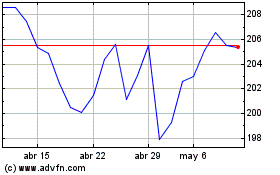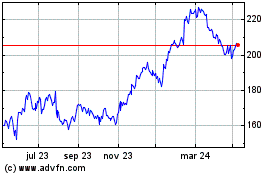Activists Lay Down Their Arms as Companies Cope With Coronavirus Spread
29 Marzo 2020 - 3:59AM
Noticias Dow Jones
By Corrie Driebusch
Being a shareholder activist investor isn't such a good look
right now.
Executives are struggling to keep their companies afloat and
their workers employed as the coronavirus spreads, and activists'
demands in many cases seem less pertinent than they did just a few
weeks ago. That's led many of the investors to walk away from
campaigns or settle them early.
Last week, Carl Icahn agreed to end his campaign to oust the
entire board of beleaguered oil company Occidental Petroleum Corp.,
settling instead for two seats and a say in choosing a third.
Starboard Value LP reached a settlement with Box Inc. that will put
three independent directors on the cloud-software company's
board.
Elliott Management Corp. recently ended its opposition to
Capgemini SE's bid for Altran Technologies SA, saying in a
regulatory filing it's willing to sell its Altran shares to the
French consulting firm.
Elliott -- like Mr. Icahn and Starboard, one of the most feared
activists in corporate America -- is seeing more opportunities for
behind-the-scenes, "constructive" ways to work with companies, a
person familiar with the matter said. That could mean helping shore
up their finances by buying up the companies' beaten-down bonds or
equity.
The shift comes at a normally busy time for activists, known as
proxy season, when they have the opportunity to nominate directors
ahead of annual meetings that tend to take place in the spring.
This year, however, it falls as companies are focused on keeping
employees safe and making payroll as revenue dissipates.
"Companies right now are struggling to keep workforces
together," said Edward McCarthy of D.F. King & Co., who
canvasses shareholders to gather votes in proxy contests. "To take
away from that is just bad for everyone."
Activist hedge funds, for their part, are struggling with the
whipsawing stock market. An index of their performance tracked by
data group HFR was down by about 11% through the end of February,
the most up-to-date information available. A greater drop could be
coming in March, as the S&P 500 has fallen more than 14%.
Some activists with concentrated portfolios are under even more
pressure. Mantle Ridge LP, run by a former lieutenant of William
Ackman who tends to hold positions for many years, has been
buffeted by a steep decline in shares of Aramark Corp. Mantle Ridge
owns a roughly 18% stake in the food-service giant, whose shares
have fallen by more than 50% this year as schools and other
institutions across the country shut down.
"Any single major bet is a bold move," said Bill Anderson of
Evercore Inc., one of the top activism-defense bankers. "And for
the short term, any bold move can be scary."
While this proxy season may be quieter than usual, it could give
way to a busy period for corporate raiders should share prices
remain low and the challenges companies now face linger.
Not all activists are retiring from the battlefield. Some
privately argue that in a crisis it matters even more to have good
managers, making it necessary in certain situations to press
on.
Starboard, led by Chief Executive Jeff Smith, recently published
a letter to eBay Inc.'s board confirming an earlier Wall Street
Journal report that it has nominated directors to the board of the
online marketplace and urging it to search for an external CEO.
Starboard acknowledged the unique period the world is in, with
Peter Feld, managing member of the company, signing the letter
"Best regards and stay healthy."
In its response, eBay said it was disappointed that Starboard
decided to announce its nominations "amidst the global Covid-19
pandemic while the board and management are trying to focus on the
business, employee health and safety, and the important CEO search
and portfolio review that are under way."
"With the volatility and the virus, it's going to be slower this
spring, sure, but that doesn't mean 2020 is a washout," said Bruce
Goldfarb, head of Okapi Partners LLC, a proxy-solicitation firm
that helps activists and companies communicate with
shareholders.
Either way, many companies are taking no chances. Some are
seeking standstill agreements with activists or settlements that
they might not otherwise have agreed to, advisers say. Others are
attempting to delay their annual meetings.
Still others, fearful that rivals or activists may take
advantage of their beaten-down stock prices to take big stakes they
can use to wield influence, are rushing to adopt so-called poison
pills, with implementation of the defense tool lately spiking to a
rate unseen in years.
Write to Corrie Driebusch at corrie.driebusch@wsj.com
(END) Dow Jones Newswires
March 29, 2020 05:44 ET (09:44 GMT)
Copyright (c) 2020 Dow Jones & Company, Inc.
Capgemini (EU:CAP)
Gráfica de Acción Histórica
De Mar 2024 a Abr 2024

Capgemini (EU:CAP)
Gráfica de Acción Histórica
De Abr 2023 a Abr 2024
